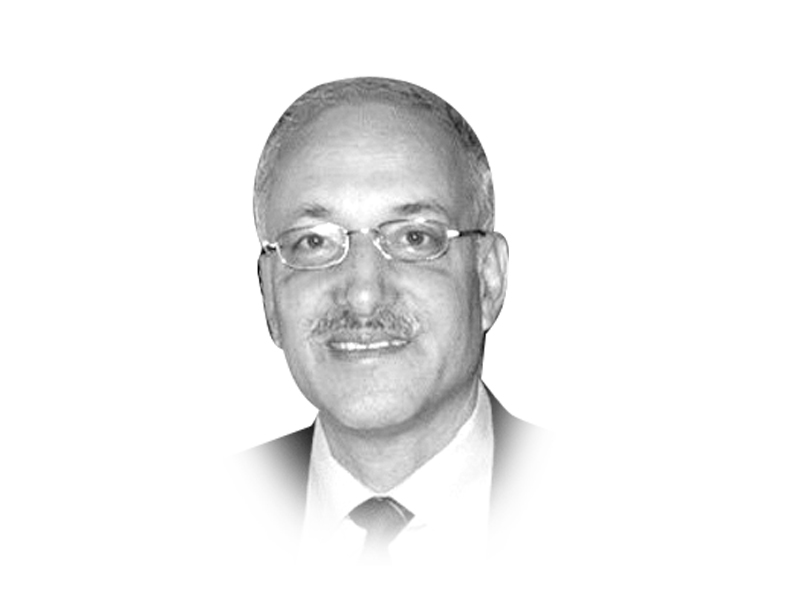
A few days back, Mr Asif Zardari defied the United States to sign an agreement on the gas pipeline with Iran despite US pressure not to do so. But perhaps, people will point out that this is merely eyewash since nobody has the money to make the pipeline anyway. All right, let us count this one out. What about the fact that Pakistan never attacked the Haqqani and Taliban headquarters in North Waziristan even when the US blowed hot and cold. Neither dromedaries laden with gold nor threats nor blandishments could make the army attack them. Indeed, it pocketed the money for fighting the war on terror but fought it in a selective manner. We need not even go into the hiding of the Quetta shura and so on, as this is enough to suggest that Pakistani decision-makers, the real ones please, were never unquestioning slaves of the United States, no matter how much money they took from the Americans.
But let us start from the beginning. Pakistan started looking towards America in the 1950s in order to strengthen the army. After all, even with a small and weak army, the Pakistanis had fought for Kashmir in 1947-48. But then there was real danger from India, or, at least, so it seemed to the high command, thus Ayub Khan coveted American weaponry. And America wanted allies against the Soviet Union, so both countries worked in their own perceived national interests. But Pakistan had little intention to fight the communists, so this weaponry was used to fight the completely useless war of 1965 — a bit like the 1947-48 war to wrest Kashmir from India. Now, unknown to Pakistanis, there was a clause in the agreement that the weapons were not for any war except against the communists. Hence, the Americans, under pressure from their own institutions, had to stop helping the Pakistanis. The Pakistani common man was now told that the Americans had betrayed Pakistan but were never told what Pakistan had done. Now, Pakistan needed other sources of weapons and a staunch friend near home. Who could be better for this role than China, which had no love lost for India and which was an emerging military power, too? So, the Pakistanis made friends with the Chinese. The Americans were furious. But their threats did not work and China did become a friend (the T-59 tanks are only one of the many fruits of this friendship). Then came what can only be called high drama. Henry Kissinger actually flew from Islamabad to Beijing to meet the Chinese leadership and who helped him? Yahya Khan. In the 1971 war, the Americans did not send the navy to fight Pakistan’s war but they did warn Indira Gandhi not to press ahead in West Pakistan.
Then came the crunch. Pakistan was keen on producing nuclear weapons while America wanted this to be stopped. Pakistan kept making the bomb and America kept up its bluster against it. India, too, had not bothered about the West in this matter but everybody thought Pakistan would have to. Nothing doing! Pakistan went ahead and the Americans had to swallow the bitter pill because they had to defeat the Soviet Union in Afghanistan, which was not possible without Pakistani help.
And, after 9/11, General (retd) Pervez Musharraf wanted legitimacy so he supported the American war against Afghanistan. The point is that both the Americans and the Pakistanis have worked in their perceived self-interest so Pakistan is wrongly considered a client state. But is it important to tell our people the truth? If we do not, and anti-Americanism grows, our governments will not have the flexibility to seek American help when necessary. It would be foolish to become hostage to misinformed public opinion. That is why such myths should be questioned.
Published in The Express Tribune, March 26th, 2013.
COMMENTS (26)
Comments are moderated and generally will be posted if they are on-topic and not abusive.
For more information, please see our Comments FAQ

















@Gp65:
I did! The client state is a phenomina of 19th &20th century. It is a rarity in 21st century: Israel is the unique client state; others fall victims of hegemonic Imperial powers, whic is also disappearing in 21st century.
Rex Minor
@Rex Minor: I think Pakistan is a client state to many masters not just USA. My examples make that clear. But this does not mean it is a banana state. I certainly did not imply that.
@gp65: @mind control:
The term Banana Republic is used fo a politicaly and militarily unstable country whose economy is very weak and largely dependent on one or two agriculural products such as Bananas or mangoes, rice or tea and is therefore economicaly, politicaly or militarily subordinate to another more powerful state in international affairs, thereby becomng a client state as well.
GP65, you nitpicked on Pakistan actions of acquiesce or defiance in its relations with the yanks and questioned Pakistan's sovereignty. I tried to explain explain them as Tit for Tat relationhip. Israel is the client state of the USA but Pakistan is neither a Banana republic nor a client state. A love hate relationship among two allies who are not equal partners.
Rex Minor
@Rex Minor:
Pakistan is not a Banana republic, nor do its leaders know what a client state is?
Parts of your statement seem to be correct.
A. With the prevalence of feudal elements in the power structure Pakistan is not a 'Republic'. But I am not sure about the Banana part.
B. Vast parts of the 'State' have been overrun by non-State actors. However, given the fact every leader appears to have a foreign sponsor, the leaders should know what a client is.
Moderators : Both these people have written to me directly, please allow respnse.
@A Peshawary: "@gp65: The reality is not so simple as narrated here;"
Not sure why this observation is directed to me. Do you disagree with something I said? If yes, please let me know what and we can discuss.
@Rex Minor: "@gp65: Pakistan is not a Banana republic,"
I never claimed it was. I agree with many things in your post and disagree with some. I am however unclear why you directed it to me. I t does not seem like a rebuttal to my post? IF it is I did not see which points you have rebutted.
@gp65: The reality is not so simple as narrated here; a lot of effort and time is needed to put the train on track after it is derailed with will and ambition. In the end the truth prevails which in today's world is DEMOCRACY.
A Peshawary
@gp65:
Pakistan is not a Banana republic, nor do its leaders know what a client state is? You fell ino the trap by accepting the authors assumptions; your comments highlights the Tit for Tat relations, of Pakistan with USA, the lack of communications between two countries, two people of different cultures and different civlisations, one can not just inore them with discussions. What is the starting point in history between these two counties? for research work one should not ignore the following event . .Pakistan becomes the member of CENTO pact with Turkey and Jordan to protect USA against the surprise attack on the USA. .Pakistan allows the USA to build a military base on its soil against the Soviet Union. . The American spy plane takes off fom the base and flies over the Soviet territoy and gets shot down. Pakistan Govt. was not informed, and could have come under direct militay attack of the soviets without receiving any assistance from the Yanks. . The USA refuses to aid Pakistan under attack from India. and is informed that the CENTO pact was to protect the member states against the Soviets only. Pakistan explodes the bomb after India explodes theirs. The rest is speculative. Pakistan has not and does not provide a safe haven to Pashtuns living in the autonomous regions of Pakistan. Neithe the USA armada nor the Pakistan miltary are in a position to confront them head on without suffering heavy losses which the citizens of the respecive counties will not accept. The continued military rule in Pakistan and coupled with foreign forces operations in Afghanistan and Pakistan has radicalised the entire people and extremism has become a normality in the entire spectrum of their social life. What these counties need is a tansition to normality and this is only possible with the culture of a dialogue and tolerence, not with confrontations.
Rex Minor
@Hasan: Mr. Hasan which economy China don't control of course indirectly. A Peshawary
Was there a need for the first paragraph? just asking??
Are we a client state? Is there any doubt?
Expected some thing substantial from a person like Tariq Rehman,what he brings out is not more than Barber Shop Gossip in Pakistan,.....I mean what is his point!!!!.Does he suggest any alternative strategy for Pakistan or is he (as other intellectuals in Pakistan) becoming deranged and perplexed by the very phenomenon of Pakistan??
So put it shortly: Pakistan obeyed US when it should not have, disobeyed it when it should have.
I guess you can say the same for Pakistan with respect to India as well..
@gp65
dude, you are spot on!
So what you are saying is that we took the money for the whole package and did half of the stuff they demanded us to do? Based on that you conclude that Pakistan is not a client state ...doesnt digest :)
"Ask the ghairat brigade and they will fume at the mouth" ET: Instead of fume, shouldn't it be foam?
Pakistan seems more a client State of Saudi Arabia and China than the USA. To believe that the Americans do not know that they are major benefactors yet taken for a ride, is also delusionary thinking.
The decision to give all support to United States in Afghanistan against USSR was clearly not in the interest of Pakistan although it was made to look as if USSR would take over Pakistan if was not made to evacuate Afghanistan. The decision to support the United States against Taliban was clearly motivated in the belief that the United States would turn to India for support otherwise. So, the decision was partly in our own interest as well.
The desire to forcibly take Kashmir is what has brought us where we stand today, and if we do not give up this dream, we will surely perish as a nation.
Basically the author is trying to say that inspite of US and Pakistan trying to work for their own interests which sometimes clash, Pakistan has been milking US and cheating at the same, playing double games. He also advises that Pakistan should stop this.,
Dr Rahman,
You have explained your point of view with logic, but logic is not truth! Now apply the same logic and you could pove that Afghanistan under Karzai is not a client state either. The new secretary of State even confirmed it today! Have a nice day Doctor!
Rex Minor
.Well you tried but I am not thoroughly convinced, just look around you in the third world, where ever the Americans made friends, those countries either wind up having dictators or got destabilized in the process. Ayub Khan was encouraged to take over by the barrel of gun and I remember when US congress said that he was a man of steel with a steel backbone. I have been living in Kansas for the 48 years and saw the Presidents come and go and their policies were always designed to benefit only the US and nobody else. Before Ayub Khan, the Pakistani PM used to send his papers to the American ambassador in Karachi for approval, look it up, they are available now in US and Pakistan archives. There is no doubt that Americans do interfere and do it pretty much, as the Americans say that there is no free lunch, so don't get all excited that Americans are not interfering. They buy our politicians, and "some others" in Pakistan. I worked with BB and the congress and I know what was going on at the State Department and Capital Hill. It is strange that some of the Pakistani generals and diplomats wind up living nearby Washington DC, and of course their children got their education with the US help before they arrive to settle here
In order to have a honor of being client state, you do not need to acquiesce to all demand of you master.
Its an emphatic "YES" .. for decades we were a client state of americans, with no real intention for soviets. Our goal was to build up military for east. After repeated failed attempts in 47, 65 and 71, the americans withdrew, and we needed another support for military. We decided to become a colony of the chinese, who today control our economy directly or indirectly, and cares least about so called friendship. Going forward, we seem to continue be someones colony, because of our mindset. We have seen how our nawabs and emperors laid down in front of British, and today our leaders continue to do so.
The article answers Yaqoob Bangsh's question from another article in this paper in affirmative.
"Or is it that the liberals of today are actually deluded?"